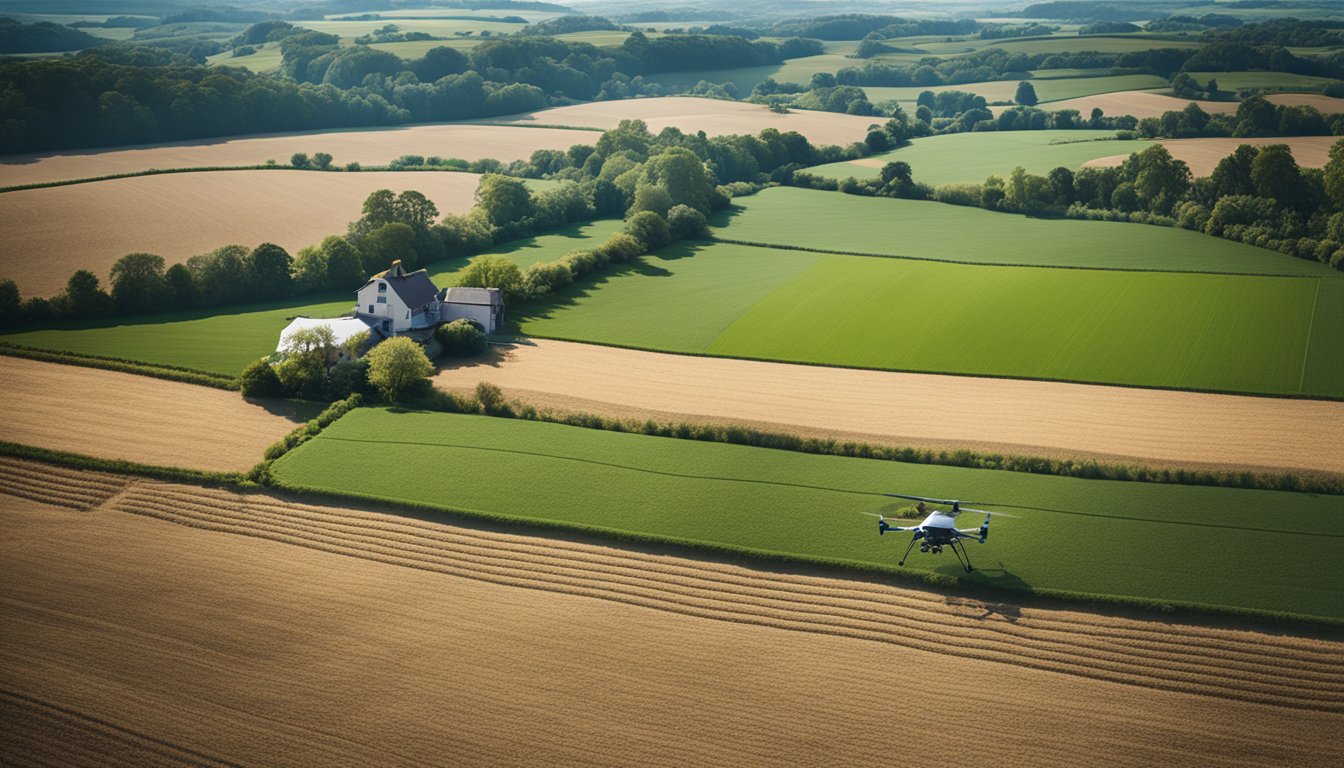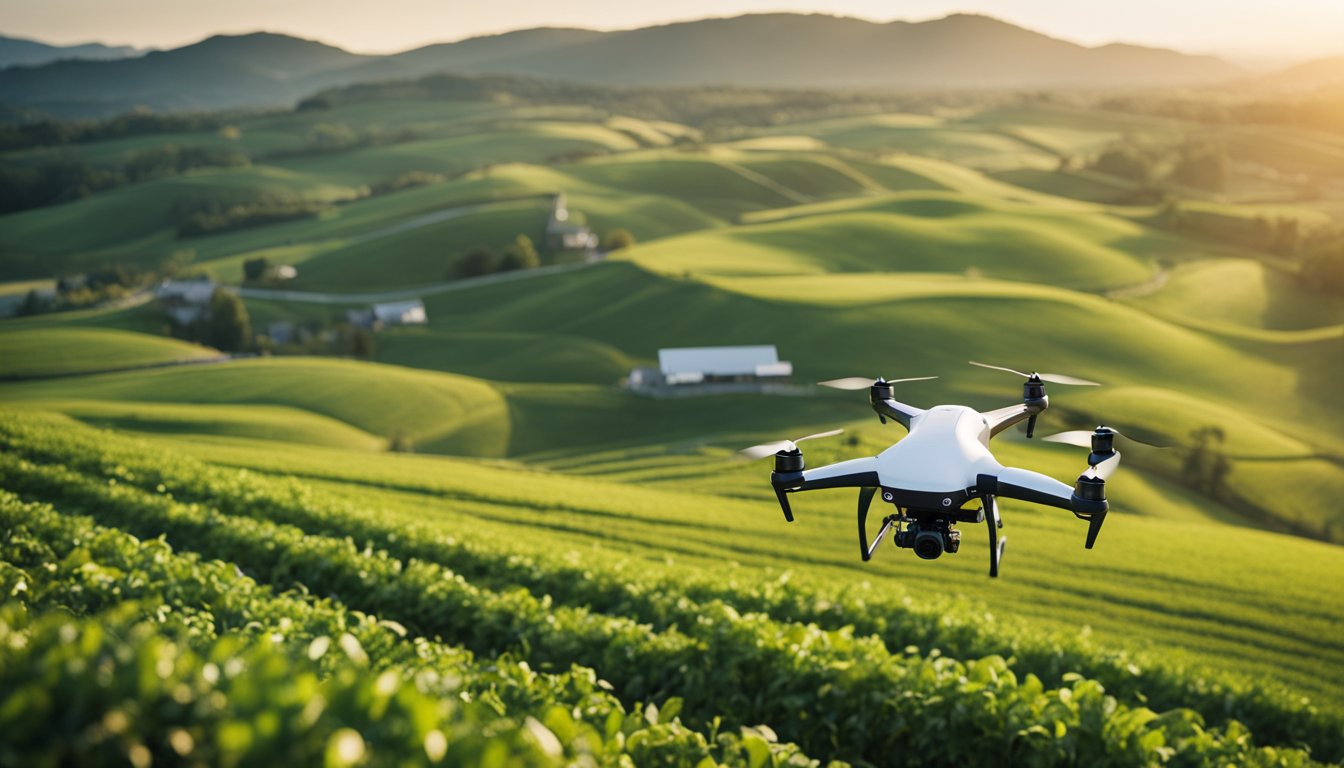Late updated: 05 Jan 2025 10:01
Written by: Oliver Bennett
Revolutionising UK Countryside With AI Technology: Transforming Rural Development
Artificial Intelligence is increasingly becoming a cornerstone in revolutionising the UK countryside, enhancing both the quality of life and economic viability. AI technology is enabling more efficient farming practices, smart transportation, and improved environmental monitoring, leading to a more sustainable future. As rural areas integrate these advanced technologies, the gap between urban and rural living is expected to close, paving the way for new forms of connectivity and growth.

Incorporating innovations like smart farming tools and IoT devices, we see a significant shift in agricultural productivity. AI-powered solutions streamline operations, optimise resource use, and provide precision agriculture capabilities, thus transforming traditional methods. Collaborations with institutions like the Alan Turing Institute further underscore the potential for technological advancements to redefine our rural landscapes.
As we embrace this digital transformation, the role of policies guided by AI-driven environmental monitoring is crucial. With AI's assistance, the Geospatial Commission can implement more informed and impactful strategies, ensuring the countryside benefits from sustainable and equitable growth. The integration of these technologies not only represents a leap forward in operational efficiency but also a vital step towards a balanced and thriving rural economy.
Key Takeaways
- AI is key in revolutionising the UK countryside.
- Smart farming tools enhance agricultural productivity.
- AI-driven policies aid sustainable rural development.
Innovations in Land Use and Agriculture
Exploring the intersection of AI with land use reveals vast potential for enhancing agriculture, conserving biodiversity, and improving decision-making processes. These innovations align with key priorities in food security and environmental sustainability.
Implementing AI in Sustainable Farming
AI technologies are revolutionising sustainable farming by optimising resource allocation and improving crop yields. Predictive algorithms enable precise monitoring of crop health, ensuring timely interventions that prevent disease and enhance productivity. Using digital twins, farmers can simulate different environmental conditions, facilitating more informed management decisions. This not only boosts efficiency but also helps minimise environmental impact, contributing significantly to the resilience of the agricultural sector.
Innovative smart tools and satellite data integration further assist in monitoring resource usage, reducing waste, and promoting sustainable practices. Our approach is deeply rooted in advancing food security and fostering a more sustainable future for UK agriculture.
Advancing Land Use Decision-Making with AI
Through AI-driven models and decision support tools, better land use planning is now achievable. By leveraging geospatial AI and spatial data, we can gain insights into optimal land utilisation, identifying potential conflicts like human-wildlife interactions and harmonising land use activities. These innovations are vital for policymakers and stakeholders aiming for economic growth and environmental sustainability.
Such tools facilitate strategic decision-making, focusing on resource allocation and addressing environmental challenges. In partnership with entities like Newcastle City Council, these technologies are shaping policy priorities and advancing land use programmes, leading to more effective land management.
AI Tools for Biodiversity Conservation and Management
AI plays a crucial role in conserving biodiversity by aiding in the development of prototype tools that monitor and manage ecosystems. Machine learning models analyse satellite and geospatial data to detect changes in land cover and assess the impacts on biodiversity. This supports efforts in maintaining balanced ecosystems and managing human-wildlife conflict.
By providing detailed insights into species distributions and habitat requirements, AI enables more targeted conservation strategies. These tools are essential for biodiversity management and ensuring the long-term health of our natural landscapes. Through integrating AI with conservation efforts, we enhance our capacity to protect valuable ecosystems, aligning conservation goals with sustainable land use practices.
AI-Driven Environmental Monitoring and Policy Impact

Harnessing AI technology offers us innovative ways to monitor environmental changes and shape policy decisions with precision. In this section, we explore the intersection of AI with climate analytics, geospatial intelligence for economic and energy security, and wildlife ecosystem protection.
Enhancing Climate Change Analytics with AI
AI plays a pivotal role in climate change analytics by processing extensive Earth Observation Data. Using large language models and advanced data science, we develop sophisticated models to predict climatic shifts.
This includes analysing satellite imagery and spatial modelling to understand land use change and project future impacts. These insights are crucial for achieving Net Zero targets and informing sustainable policy decisions.
AI also helps us identify bias in AI models, ensuring that our analytics are both accurate and equitable.
Geospatial Intelligence for Energy and Economic Security
Integrating geospatial intelligence fortifies our approach to energy security and economic planning. The Geospatial Commission utilises earth observation and satellite images to map resources and assess risks. This involves the geospatial ecosystem, including open-source tools for enhanced analysis.
Through geospatial intelligence, we monitor infrastructure and environmental changes, vital for policy frameworks that support economic stability. By leveraging AI, we can enhance energy distribution efficiency and anticipate needs for future development.
Utilising independent reports, we ensure transparency and informed decision-making, bridging the gap between technology and policy.
AI Technologies in Wildlife and Marine Ecosystem Protection
AI technologies are transforming our ability to protect wildlife and marine ecosystems. Our focus includes monitoring marine life and preserving marine biodiversity using AI-driven advisory systems. Dark diversity, the study of unidentified species, benefits from AI's pattern recognition, which identifies species from underwater ecosystems.
Additionally, distributed acoustic sensing aids in illegal wildlife trade prevention by detecting unauthorised activities. AI helps address AI colonialism by involving local communities in conservation efforts, ensuring ethical technology use.
The tools also facilitate marine monitoring, helping policymakers take informed protective measures. Conservation tools powered by AI ensure sustainable management of natural resources.
Frequently Asked Questions

Artificial intelligence (AI) is reshaping the UK countryside, particularly through its applications in agriculture, governance, and strategic positioning within the global tech landscape.
How is AI transforming agricultural practices in the UK?
AI is revolutionising agriculture by enabling more precise farming techniques and optimising yields. Through the use of AI-powered machines and IoT devices, we are seeing improvements in monitoring crop health, predicting weather patterns, and managing resources efficiently.
What are the ethical considerations being addressed by the UK government in the deployment of AI technologies?
The UK government is focusing on ensuring AI technologies are deployed ethically, with an emphasis on transparency, fairness, and accountability. Efforts include stringent guidelines to prevent bias and discrimination, ensuring that AI applications respect privacy rights and are used responsibly.
In what ways does the AI Act 2024 impact tech innovation and regulation within the UK?
The AI Act 2024 sets the framework for innovation while ensuring safe and responsible AI development. It introduces regulations that foster innovation by providing clear standards and protocols, while safeguarding public interests, thus encouraging tech companies to operate within defined ethical boundaries.
What strategies has the UK government employed to position itself as a leader in AI technology?
The UK government has invested in robust research and development initiatives, forming strategic partnerships with industry leaders and academic institutions. We see efforts in nurturing talent through educational programmes and promoting the adoption of AI across various sectors to solidify the UK's leadership in AI technology.
Which country currently leads in AI advancements, and how is the UK positioning itself in this landscape?
Countries like the USA and China are currently leaders in AI advancements. The UK is positioning itself by investing heavily in R&D and establishing an AI-friendly regulatory environment, aiming to leverage its expertise in AI ethics and governance to carve out a leadership role globally.
How does the UK's approach to AI governance compare to other leading nations?
The UK's approach to AI governance is characterised by its focus on ethical considerations and comprehensive regulatory frameworks. By prioritising transparency and accountability, we distinguish ourselves from other nations by promoting responsible AI development, reducing risks, and ensuring public trust in AI technologies.
